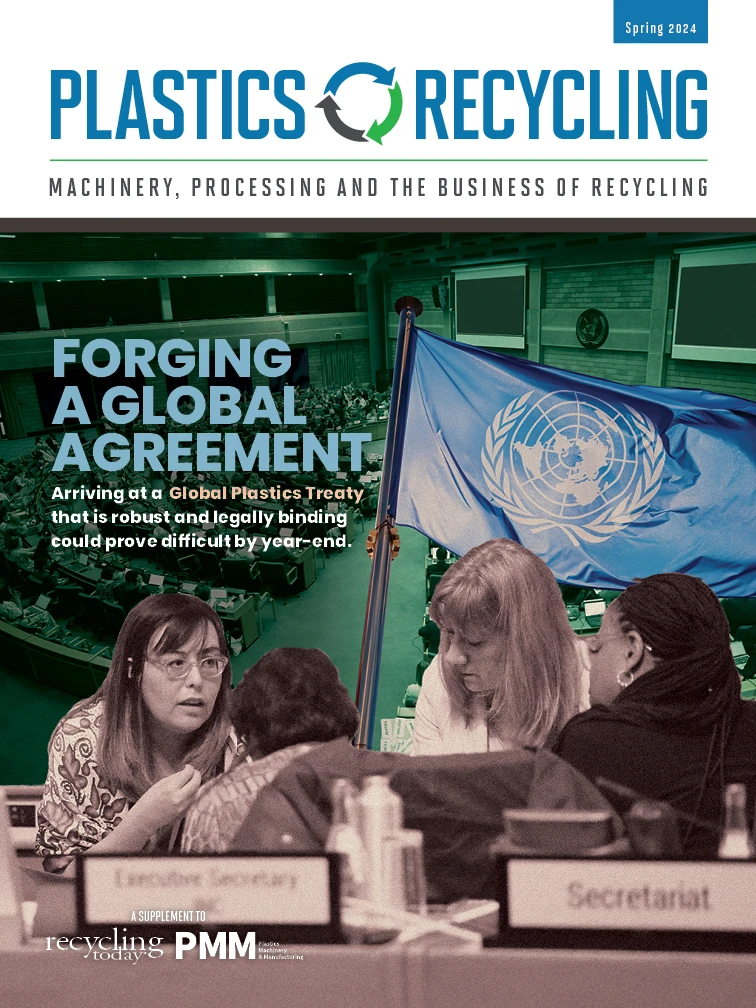Sean Whiteley doesn’t have a degree in polymer science or chemistry, but he does have a passion for the circular solutions provided by Revolution, a recycler and plastic product manufacturer based in Arkansas.
Prior to becoming CEO of the company, Whiteley worked in the investment and private equity sector, giving him some exposure to the plastics industry. He was introduced to Revolution more than a dozen years ago through a consulting assignment. “I fell in love with the circular solutions that they were pioneering in the industry and the way that they were thinking holistically about plastic production, plastic recovery and plastic reuse,” he says.
Whiteley joined the business as CEO full time in 2012. “I could see the potential of the business model around circular solutions, circularity, environmental sustainability, greenhouse gas emissions reduction, landfill diversion and water conservation,” he says.
Whiteley recognized that Revolution had all the tools to address some of the challenges the plastics industry faces, though he noted some needed to be developed further.
While he says he’s played a small part in the company’s success, Revolution has been able to refine and build its product and service offering with the help of additional resources and skilled people who share Whiteley’s passion. “That’s really what’s been so instrumental in our businesses; we have found people who love the circularity model and applying that model to the challenges that they see across our industry,” he says.
In the following interview, which has been edited for clarity and conciseness, Whiteley shares his perspectives on plastics recycling and the opportunities and challenges facing the sector.
Q: How have you seen plastics recycling change over the years?
A: Fortunately, its profile has been elevated and there are many more conversations around the need for end-of-life plastic solutions and, in particular, the need for postconsumer recycled content in the new materials we are making—whether it’s the packaging space, the agricultural space, the logistics and transportation space, the medical space, food and consumer goods. There’s a growing sense and a coalescence around circular solutions that meet these needs.
So, the conversation is much better than it was 12 years ago; you didn’t really hear much about it in many sectors, but now it is in every sector.
No. 2, with that conversation, there are also smart people interested in the space, which brings innovation and new equipment, new processes, new ways of thinking about how we solve the challenge of plastic after its initial useful life.
Q: What lessons have you learned about the industry that have helped you throughout the years?
A: It is hard. What we do is very difficult. Because of that difficulty, we’ve seen a lot of good companies with good intentions and good ambitions come into the market and fail. It takes a thoughtful, determined approach. It takes real rigor behind the work that you do to create the right model to allow for continued longevity in this space.
Q: Will vertical integration be a necessity for plastics recyclers in the future? How has Revolution benefitted from this approach?
A: It’s been important for us. It’s a model we embrace, but I can’t speak to others in the industry. Others may have a different viewpoint; but, for us, that control and connection across the supply chain really reinforces our model, and each segment reinforces the other, so it provides real strength and connectivity for our organization.

Explore the Spring 2024 Plastics Recycling Issue
Check out more from this issue and find your next story to read.
Latest from Recycling Today
- Orion ramping up Rocky Mountain Steel rail line
- Proposed bill would provide ‘regulatory clarity’ for chemical recycling
- Alberta Ag-Plastic pilot program continues, expands with renewed funding
- ReMA urges open intra-North American scrap trade
- Axium awarded by regional organization
- Update: China to introduce steel export quotas
- Thyssenkrupp idles capacity in Europe
- Phoenix Technologies closes Ohio rPET facility





